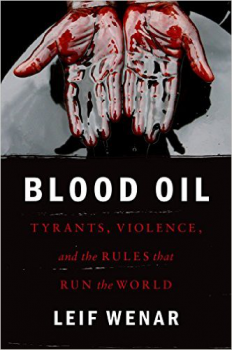Book: BLOOD OIL: Tyrants, violence and the rules that run the world

BLOOD OIL: Tyrants, violence and the rules that run the world
by Leif Wenar, Published by OUP
Have you ever surveyed the world's deadly and destructive conflicts, and concluded, reluctantly, that 1) it's all about oil and so 2) there's nothing we can do about it? If so, this is the book for you. Rooted in both morality and common sense, Wenar provides practical proposals for how the international community can bring transparency and accountability to the profoundly corrupt places where rulers treat their nation's mineral and oil wealth like a personal bank account.
Wenar illustrates how resource-rich authoritarian regimes use a combination of violence and bribery to control their populations, enabling rulers to sell their nation's wealth to foreigners at will. The buyers treat this stolen property as if the dictator selling it had legal title. In the rare cases when citizens do benefit (Norway, Botswana) strong civil society pre-dated the discover of resources, enabling people to hold their rulers accountable. In the past 40 years, though, oil states have generally become poorer and more violent, while their dictators buy Western real estate and luxury goods. We, as consumers, are complicit in this theft while we buy products made of oil and other resources. Meanwhile, the citizens of Equatorial Guinea, the Democratic Republic of Congo, Angola, etc., struggle to survive.
As the UN Rapporteur on Torture said after a visit to Equatorial Guinea: "They don't even hide their torture instruments."
Throughout the book, the author draws parallels with the slave trade and the consumer boycott of slave sugar. He explores the geopolitical and commercial interests at work in appeasing monstrous dictatorships; and the stupidity of propping up Gulf countries where wealthy individuals fund international terrorism. He also explains how regimes use violence and a pyramid of subordination where patronage buys political loyalty from the military and other cronies.
Wenar's catalogue of greedy and corrupt rulers, and their degenerate behaviour, is depressing. Yet, he also shows how the age-old rule, "might is right" has been eroded. The Kimberly Process, the Extractive Industries Transparency Initiative, and Publish What You Pay, all require more responsible behaviour by commodity buyers. Groups like Global Witness, Freedom House and Transparency International shine a light on the kleptomania, human rights abuse and environmental destruction in dismal, resource-cursed nations. And international efforts to stop money-laundering have been given new strength by anti-terrorism initiatives.
The author calls for a combination of incentives for those resource-rich countries adopting more transparent and accountable policies; and personalised targeted smart sanctions on autocrats bleeding their people dry. He also envisages a Clean Trade Act that requires us to stop buying resources from murderous dictators, finding more ethical sources. He provides a shopping list of benchmarks whereby we can measure whether trade is appropriate. Most important, he illustrates how it is in the interests of business and governments (even the Chinese) to abide by a more ethical approach. Layered with examples from history and philosophical musing, Wenar's argument is convincing and empowering.


















